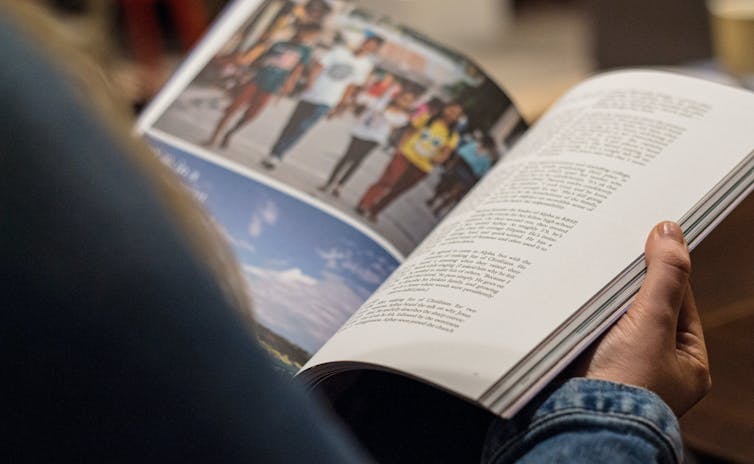
Blair Fraser/Unsplash
Alexandra Dane, University of Melbourne
Australia’s literary journals are produced in a fragile ecosystem propped up by a patchwork of volunteer labour, generous patrons and, with any luck, a small slice of government funding.
The Sydney Review of Books, the Australian Book Review and Overland were among a group of publications who sought four-year funding from the Australia Council in 2020 but were unsuccessful.
These publications join the ranks of many others – among them Meanjin and Island – defunded by state or federal arts funding bodies in recent years.
Read more:
The Meanjin funding cuts: a graceless coup?
These magazines are vital for today’s publishing industry. For many authors literary magazines provide the first opportunity for publication. For editors and arts administrators, they provide a training ground for life-long careers in Australia’s creative sector.
The past decade has seen a steady decline in arts funding going to individuals and organisations. According to Chairman of the Copyright Agency and former media executive, Kim Williams, writing in the Sydney Morning Herald:
[…] if funding for literature had been maintained as in the mid-70s, considering inflation and population growth, it should be at $12 million, at least. Today, it stands at just $5 million (compared with $4.2 million 30 years ago).
The list of defunded writing-focused organisations in the most recent multi-year funding round is stark. Those losing their multi-year status include Artlink, Eyeline, Art Monthly, the Australian Script Centre, Playwriting Australia, Sydney Writer’s Festival and Brisbane Writers Festival.
Without securing medium-term support, these organisations face an uncertain future.
Vital discourse
In response to the 2020 funding announcement, editor of Australian Book Review, Peter Rose, stated the decision demonstrates
little understanding of [the magazine sector’s] contribution to the literary ecology, and no appreciation of the dire consequences for readers, authors, contributors and publishers.
The cultural discussions within the pages of literary journals set the agenda for the more higher-profile but slower-moving institutions such as publishers, prizes and festivals.
Literary magazines are often the first place authors are published. Against the backdrop of an industry largely staffed by white, middle-class people, small magazines are at the forefront of bringing more Australian writing to the surface from writers of colour, First Nations writers, disabled writers, trans writers and working-class writers, challenging those who hold power at the top of the sector.
Read more:
Express Media is unique and young people need it
Writing in 2015 about the position magazines such as Island or Overland occupy, Emmett Stinson noted these publications:
[…] are essential to contemporary literary culture: they showcase new and emerging writers; […] offer more extended literary debates and discussions than the broadsheets; comprise a venue for journalism that contains views outside of the liberal mainstream; serve as rallying points for different communities of readers and coteries of authors […]
Ben Etherington’s essay about the parallel lives and deaths of Mudrooroo and Les Murray, Cher Tan’s exposition and critique of taste production on the internet, and Blak Brow – which was written, edited, illustrated, curated and performed by First Nations creators – are among countless examples of the ways literary magazines carve out space for critique, expression, consideration and reflection.
In shifting funding away from small magazines, we lose the place for these discussions.
Not a competition
Uncertainty, instability and fragility are perhaps the defining characteristics of small magazines.
The decisions to not fund literary magazines not only have a significant impact on the individual publications, but also to Australian cultural discourse.
What gets published within the pages of these magazines can entertain us, it can inspire us to critically examine the world around us, and can help us understand culture that moves us.
Vibrant discussion about culture, society and the arts does not happen by accident. It must be carefully nurtured and requires financial support.
The Australia Council make extremely difficult decisions about what gets funded and what doesn’t.
Not every organisation and publication and festival can receive funding. Those who don’t secure funding are no more or less worthy than those who do. Reduced financial support for Australia’s creative endeavours encourages artists to turn against one another in judgement of what should and should not receive funding.
Australian artists entertain us, challenge us and allow us to see things from different perspectives. Fulfilling a capitalist desire for competition, however, only distracts from the importance of Australian artists and the contribution the creative sector makes to our lives.
Correction: a reference to the Wheeler Centre has been removed as they did not apply for funding in 2020.![]()
Alexandra Dane, Lecturer, University of Melbourne
This article is republished from The Conversation under a Creative Commons license. Read the original article.







comments